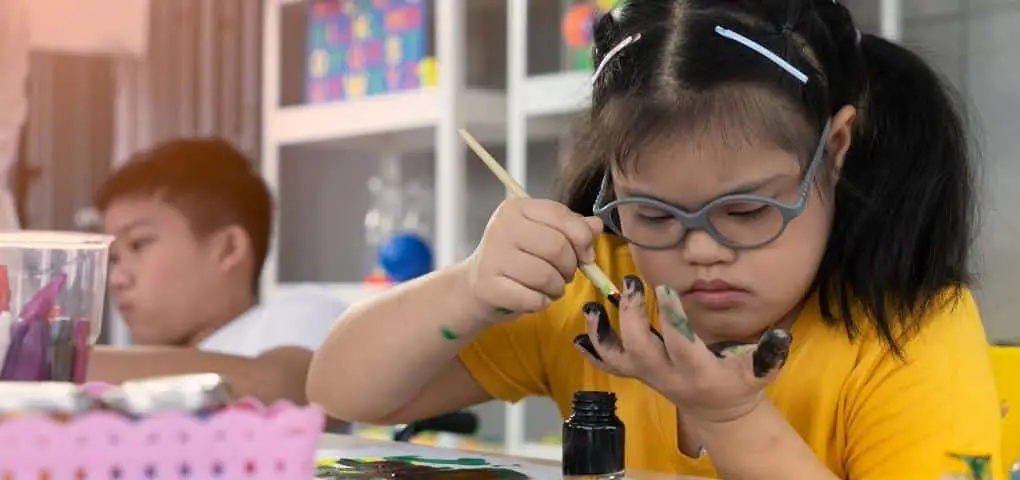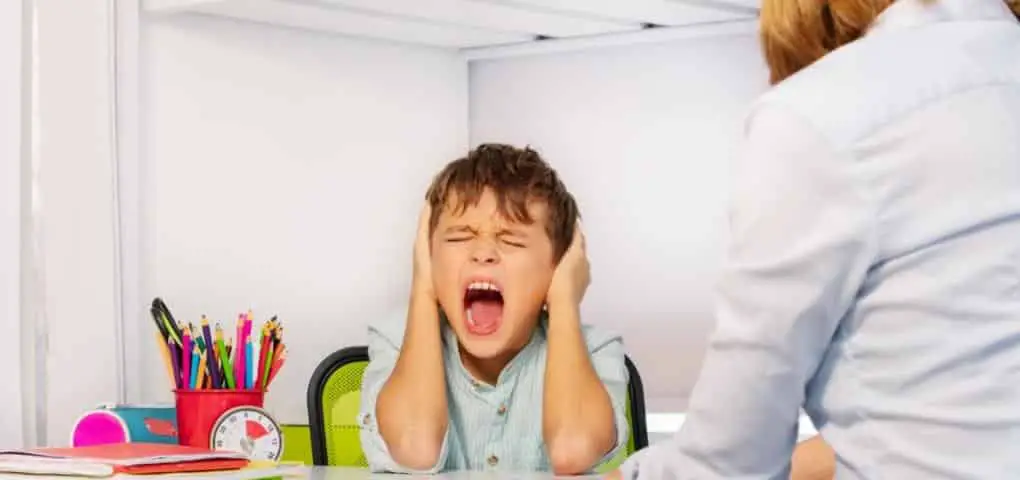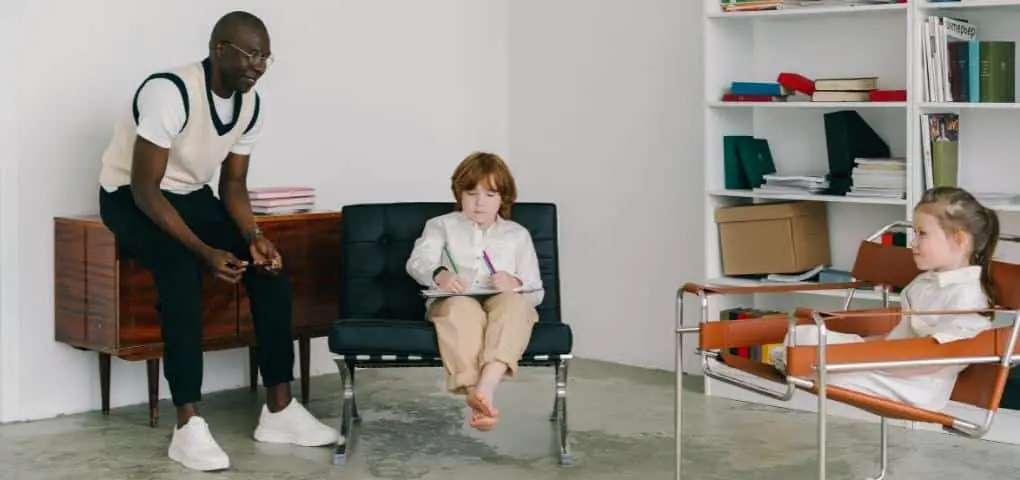There are a lot of myths and misconceptions about autism. One of the biggest ones is that parents of autistic children should follow a specific set of rules in order to “cure” their child. This could not be further from the truth!
In this blog post, we will discuss some of the things that you should NOT do if you have an autistic child. Knowing what not to do with an autistic child can be very helpful for you and your child.
We hope this information will help you better understand and support your child!
What Is Autism?

Autism is a neurological condition affecting how an individual perceives and interacts with the world around them. It is a spectrum disorder which affects each person in different ways and to varying degrees. There is no “cure” for autism, but there are many various therapies and interventions that can help individuals with autism lead happy and successful lives.
Generally, autism is when someone has a difficult time with social interaction, communication, and repetitive behaviors. With the right support, people with autism can learn to cope with their symptoms and live happy lives.
Autism spectrum disorder (ASD) is a range of neurodevelopmental disorders that include autistic disorder, Asperger’s syndrome, and pervasive developmental disorder not otherwise specified (PDD-NOS).
Autistic Disorder
Autistic disorder is the most severe form of ASD. People with autistic disorder have significant impairments in social interaction and communication. They may also have repetitive behaviors and restricted interests.
Asperger’s Syndrome
Asperger’s syndrome is a milder form of ASD. People with Asperger’s syndrome typically have normal language development, but they may have difficulty with social interaction and nonverbal communication. They may also have repetitive behaviors and restricted interests.
PDD-NOS
PDD-NOS is also a milder form of ASD. People with PDD-NOS typically have some difficulties with social interaction, communication, and repetitive behaviors. However, their symptoms are not as severe as those with autistic disorder or Asperger’s syndrome.
When Is Autism First Manifested?

The symptoms of autism typically begin to manifest before the age of three. However, some children may not be diagnosed until they are older. Early intervention is important for all children with ASD so that they can get the support and resources they need to reach their full potential!
The most common symptoms of autism as manifested by an autistic child include the following:
Social Withdrawal
Social withdrawal is when a child does not interact with other people, especially children their own age. They may avoid eye contact and seem uninterested in engaging in social activities. An autistic child is content with being on his own.
Repetitive Behaviors
Repetitive behaviors occur when a child engages in the same behavior repeatedly. This could be something like hand-flapping, spinning, or rocking back and forth. An autistic child will manifest these behaviors unknowingly. Repetitive behaviors are highly manifested by autistic children of all ages.
Restricted Interests
Restricted interests are when a child becomes fixated on a certain object or activity. They may want to only play with one type of toy or talk about the same topic all the time. An autistic person might not be interested in things that fall outside their interests. This makes an autistic person seem aloof and insensitive.
Communication Delays
Communication delays are when a child has difficulty communicating their wants and needs. This could be because they do not use words, or they may use words but have difficulty putting together sentences. Autistic children may try their best to communicate. However, people communicate with autistic kids, or autistic people assume that there is no way to understand them. This applies to autistic adults, too.
Lack Of Eye Contact
Lack of eye contact is when a child does not make eye contact with other people. They may look past people or down at the ground instead. This is usually because they are not interested in engaging with other people. Autistic people do not engage in eye contact because it makes them uncomfortable. This is one of the most obvious signs of autism spectrum disorder.
Unusual Body Posturing
Unusual body posturing is when a child has unusual movement patterns. This could include flapping their hands, walking on their toes, or spinning in circles. A child with autism will manifest unusual body posturing most of the time. This might even be manifested by an autistic adult at times.
Lack Of Interest In Other People
Lack of interest in other people is when a child does not seem interested in interacting with other people. They may not want to play with other children or participate in group activities. This is usually because they prefer to be alone.
Monitoring a child’s behavior will help determine whether a child is just manifesting challenging behaviors or they have autism. Autistic people find it hard to understand other people, just as most people find it hard to understand autism.
Difficulty Understanding Emotions
Normally, kids learn to understand emotions by observing the facial expressions and body language of other people. However, kids with ASD may have difficulty understanding emotions. This is because they may not pick up on social cues, or they may not be able to interpret the emotions of other people. A child’s life becomes very different when they find it hard to process other people’s emotions.
There are many different ways that autism manifests itself, and each child is different. If you think your child may be displaying symptoms of ASD, it is important to talk to your pediatrician. They can refer you to a specialist who can provide a diagnosis and recommendations for treatment and intervention.
Early intervention is key for all children with ASD! Early intervention also helps protect the mental health of autistic children’s parents or guardians. Other parents might even gain self-confidence once early interventions are made for their kids.
What Causes Autism?

The cause of autism is unknown. However, there are many theories about what could potentially contribute to the development of ASD. Some of these include:
Genetic Factors
There is evidence that ASD can be passed down from parents to their children. This suggests that certain genetic factors may contribute to the development of ASD.
Environmental Factors
Many environmental factors have been linked to ASD. These include exposure to toxins, such as lead or mercury, during pregnancy. Additionally, some research has suggested that having a viral infection during pregnancy could also increase the risk of ASD.
Brain Structure And Function
There is evidence that the brains of people with ASD are different than the brains of people who do not have ASD. Specifically, there are differences in the way that certain regions of the brain development and function. Additionally, some research has suggested that people with ASD may have an imbalance of certain chemicals in their brains.
While there are many theories about what could potentially cause ASD, the exact cause is unknown. More research is needed in order to determine the specific factors that contribute to the development of this disorder.
7 Things You Shouldn't Do With An Autistic Child

If your child has been diagnosed with autism, there are some things you should avoid doing in order to help them reach their full potential. Here are the things you should not do with an autistic child:
Don’t Overwhelm Them With Instructions
When you give a child with ASD instructions, it’s important not to overwhelm them. This means that you should avoid giving them too many instructions at once or instructions that are too complicated. Instead, break the instructions into simple steps they can easily understand and follow.
Don’t Punish Them For Meltdowns
Meltdowns are a common symptom of ASD, and they are usually out of the child’s control. Punishing a child for a meltdown will only worsen the situation and could lead to behavioral issues. Instead, try to remain calm and provide comforting words or physical touch.
Don’t Force Them To Interact With Others
Some children with ASD may not be interested in interacting with other people. This doesn’t mean that you should force them to do so. Instead, let them take the lead and only interact with others when they are ready and willing.
Don’t Ignore Their Interests
Many children with ASD have special interests that they are very passionate about. These interests can be used as a tool to help them learn and grow. Therefore, it’s important to encourage their interests and not ignore them. Otherwise, you will end up missing out on a valuable opportunity to connect with your child.
Don’t Take Things Personally
It’s important to remember that ASD is a neurological disorder and not something the child can control. Therefore, you should not take anything they do or say personally. Instead, try to understand where they are coming from and respond in a supportive and understanding way. This way, you can build a strong relationship with your child that is based on trust and mutual respect.
Don’t Discourage Them
A lot of people make the mistake of discouraging children with ASD from doing things that they are interested in. This can be harmful to the child’s development and self-esteem. Instead, you should encourage them to pursue their interests and celebrate their successes. Doing this will help them build confidence and feel good about themselves.
Don’t Put Them Under Pressure

Children with ASD often feel a lot of pressure to conform to societal norms. This can be overwhelming and stressful for them. Therefore, it’s important to avoid putting them under pressure. Instead, let them take their time and do things at their own pace. This will make them more likely to succeed and feel good about themselves.
By following these tips, you can help your child with ASD reach their full potential. Remember to be patient, understanding, and supportive. With your help, they can overcome any challenges that come their way.
How You Can Help Kids With ASD
Now that you know what not to do with a child with ASD, it’s time to focus on what you can do to help them. Here are some tips:
Encourage Their Interests
Children with ASD often have very specific interests. By encouraging these interests, you can help them learn and grow. Encourage them to explore their interests and celebrate their successes. This way, they will gain confidence and feel good about themselves.
Provide Structure
Children with ASD often thrive on routine and structure. By providing a consistent routine, you can help them feel more comfortable and secure. Establish a daily routine and stick to it as much as possible. This way, they will know what to expect and will be able to predict what is going to happen next.
Be Patient
It’s important to be patient with children with ASD. They often need more time to process information and may move at a different pace than other children. Try not to rush them or force them to do things that they are not ready for. Instead, let them take their time and do things at their own pace.
Offer Support

Children with ASD often need extra support. Offer them words of encouragement and praise when they do something well. This way, they will feel supported and appreciated. Additionally, you can provide them with resources and information about ASD. This way, they will be able to better understand their condition and find ways to cope with it.
These tips will help kids with ASD feel supported and appreciated. Additionally, they will help them understand their condition and find ways to cope with it. Remember to be patient, understanding, and supportive. With your help, they will be able to unlock their full potential.
Why Is Routine Important For Kids With ASD?
Routine is important for kids with ASD for a few reasons. First, it helps them feel more comfortable and secure. When they know what to expect, they are less likely to feel anxious or overwhelmed. Kids with ASD do not like feeling anxious or overwhelmed because it can overload their senses.
Second, routine helps kids with ASD predict what will happen next. This way, they can prepare themselves for what is coming and will not be as surprised by changes. Children with ASD feel very uncomfortable about changes because they do not know how to deal with them.
Finally, routine helps kids with ASD focus on what they need to do. When everything is chaotic, it is hard for children with ASD to focus on anything. Having a routine will help them focus on the task at hand and be more successful.
What Interventions Can Help Kids With ASD?

There are different interventions that can help kids with ASD. The most important thing is to find what works best for your child. Here are some examples of interventions that have been shown to be effective:
Applied Behavior Analysis (ABA)
ABA is a type of therapy that focuses on changing behavior. It has been shown to be very effective in treating ASD. This is because it uses positive reinforcement to encourage desired behavior. Consult with your pediatrician regarding this and options of an online ABA therapy.
Speech Therapy
Speech therapy can help children with ASD improve their communication skills. This is important because it can help them better interact with others. Additionally, it can help them learn how to express themselves.
Occupational Therapy
Occupational therapy can help children with ASD improve their fine motor skills. This is important because it can help them with daily tasks such as eating and dressing. s.
Social Skills Training
Since kids with ASD often have difficulty interacting with others, social skills training can be very helpful. This type of intervention teaches children how to interact with others in a socially appropriate way.
These are just a few examples of interventions that can help kids with ASD. It is important to find what works best for your child and to provide them with the support they need to succeed.
How Does ASD Affect Kids' Parents?

An autism diagnosis can be very overwhelming for parents. There is a lot of information to process and it can be difficult to know where to start. However, it is important to remember that you are not alone. Many resources and support groups are available to help you through this journey.
Parents of kids who have been diagnosed with ASD often feel a range of emotions. These can include sadness, anger, anxiety, and confusion. It is crucial to allow yourself to feel these emotions and to process them in a healthy way.
Additionally, it is important to seek out support from others who understand what you are going through. Raising a child with ASD can be challenging, but it is also rewarding. With the right support, you can do it!
Below are the things that parents should refrain from doing if their children have been diagnosed with ASD:
Do Not Blame Yourself
It is important to remember that you are not responsible for your child’s ASD diagnosis. There is nothing you could have done to prevent it, and there is nothing you could have done to cause it. Accepting this fact can be very difficult, but it is important to do so to move forward.
Do Not Compare Your Child to Others
Every child is unique and should be treated as such. Comparing your child to others will only make you feel worse and will not help your child in any way. Accept your child for who they are and provide them with the support they need to succeed.
Do Not Isolate Yourself
It is important to remember that you are not alone. There are many resources and support groups available to help you through this journey. Do not isolate yourself, as this will only make things harder. Seek out support from others who understand what you are going through.
Do Not Lose Hope
Raising a child with ASD can be challenging, but it is also rewarding. With the right support, you can do it! Do not lose hope, and remember that you are not alone. There are many resources available to help you through this journey.
Parents of kids who have been diagnosed with ASD also need to be extra careful of the following:
Conclusion
Children who have been diagnosed with ASD can lead happy and successful lives with the right support. Parents must be careful not to blame themselves, compare their children to others, or isolate themselves. Additionally, they must be aware of their child’s behaviors and never give up. With the right support, anything is possible!
If you are a parent of a child with ASD, please remember that you are not alone. There are many resources available to help you through this journey, especially with what not to do with an autistic child. So do not hesitate to reach out for help!
Frequently Asked Questions
What soothes an autistic child?
These are just a few ideas. You will need to experiment to see what works best for your child.
What are some red flags for autism?
- No babbling or pointing by age 12 months
- No single words by 16 months
- No two-word phrases by 24 months
- Loss of previously acquired speech, language, or social skills
- Poor eye contact
If you notice these red flags, please speak with your child's doctor as soon as possible. Early intervention is vital for children with ASD.


Leave a Reply